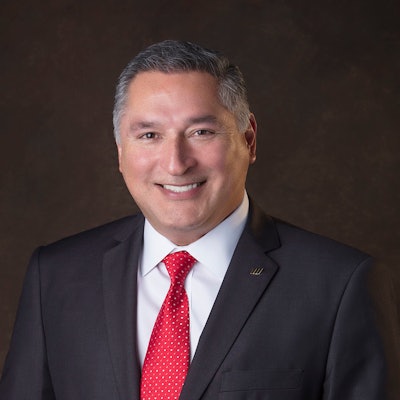I grew up in a family of migrant farmworkers, helping to grow and harvest onions, cotton, sugar beets, spinach and cucumbers throughout the United States. My father often talked about education and how important it was that his children take learning seriously. Having left school in second grade, he wanted me and my siblings to graduate high school and go to college. My mother also dropped out of school at a young age. This meant while I had plenty of drive to pursue an education, I had few role models I could look to for guidance. My older brother changed that.  Javier Villalobos
Javier Villalobos
The first to go to college in our family, my brother blazed a path I could follow. I was always right on his heels. He graduated from high school, went to college, and earned a degree in accounting. I did the same. Then my brother went to law school, and I, once again, followed in his footsteps. It was never easy. When I wasn’t studying or in class, I was working at the library or at Domino’s Pizza. I would often get off a shift at 4 a.m. and be in class just a few hours later. No matter how challenging the experience was, however, I always knew I could see it through. Because I had already seen my brother do it first. Like a fullback on a football team, he opened up holes for me, and I just ran through them.
Today, I am the mayor of McAllen, Texas. In recent years, McAllen has been undergoing an economic transformation, even being named “a top-ten boomtown” in 2018. At the same time, it remains a diverse place, with 85 percent of our population being Hispanic. There is a great need to ensure our community -- which has long been underserved by higher education -- achieves the kind of postsecondary success necessary to thrive in our evolving workforce and economy. It is vital they are able to see what is possible for themselves and their families, just as I was fortunate to witness so many years ago.
Research has shown the immense impact a person pursuing postsecondary education can have on the college-going aspirations of their family members. A 2019 study from the National Bureau of Economic Research found that an older sibling’s college attendance substantially increases the college enrollment rate of their younger siblings. An earlier, similar study from Harvard University found that 69 percent of younger siblings enrolled in the same type of college as their older siblings. The research suggests that older siblings who attend college serve as important points of both inspiration and guidance, particularly in families from less advantaged communities and with lower chances of going to college.
The 2019 study described older siblings' college choice as a “high-touch intervention, providing prolonged exposure to another person’s experience of the complex good that college education represents.” This means when an institution works to ensure learners, especially first-generation students and students from low-income families, feel welcome and supported, they are increasing the likelihood of other students also pursuing the life-changing experience of postsecondary education. Indeed, for Hispanic students, family background ranks among the most important contributing factors to their college enrollment.
I have seen this in action at institutions that serve the McAllen community. Local resident Daisy Garcia was working as a cleaning lady at GMC dealerships when, inspired by other family members, she decided to go to school to become a dental assistant. But she had many questions and concerns about how to make this goal a reality. Fortunately, the welcoming staff at The College for Health Care Professions answered every question she had and she was soon enrolled. The support didn’t stop there, however, with staff members even calling to check in on Daisy when she was running late for class and making sure she had the support she needed to stay on track toward her certificate.
These kinds of experiences are not uncommon at CHCP, which recently was the focus of a study, conducted by Rice University, that found the overall graduation rate for Hispanic students included in the study had a graduation rate of 78 percent and placement rate of 80 percent. Daisy now works as a dental assistant at Agua Dental, but that’s not the end of her story — or her family’s. Since earning her certificate she has inspired two other members of her family to enroll in programs at CHCP: her husband and her sister.
We need many more students like Daisy and my brother to serve as guiding lights for their siblings, partners, and children. Higher education and community leaders must do more to enroll and support first-generation learners and students from underserved communities, providing them with the tools they need to inspire and steer others to follow in their footsteps. We must recognize the tremendous power of getting just one person to walk through higher education's door and persist toward a credential -- and how that act can ripple through generations and move entire communities forward.
Javier Villalobos is mayor of McAllen, Texas, a city located about 13 miles from the U.S.-Mexico border.















